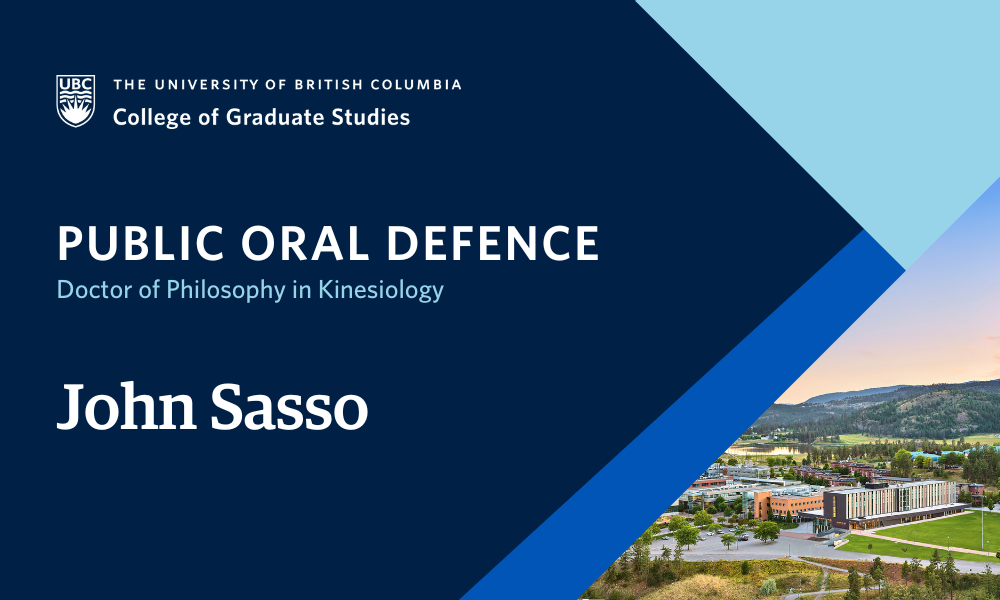
- This event has passed.
Dissertation Defence: Intermittent Modulation of Exercise and Recovery for Cardiovagal Conditioning
September 5, 2024 at 8:00 am - 12:00 pm

John Sasso, supervised by Dr. Neil Eves, will defend their dissertation titled “Intermittent Modulation of Exercise and Recovery for Cardiovagal Conditioning” in partial fulfillment of the requirements for the degree of Doctor of Philosophy in Kinesiology.
An abstract for John Sasso’s dissertation is included below.
Examinations are open to all members of the campus community as well as the general public. Registration is not required for in-person exams.
ABSTRACT
A well-prescribed exercise program can yield significant health and fitness benefits, but excessive training loads can lead to physiologic disturbances and autonomic imbalance. Strategic modulation of exercise and recovery may condition the ANS to recover and adapt more effectively. This research explores novel, accessible methods of within-session exercise-recovery modulation to accelerate cardiovagal withdrawal and reactivation and preserve autonomic balance throughout training. This approach aims to improve health and fitness outcomes while minimizing the risks associated with high workload training.
Study #1 investigated the effects of supine recovery within a high-intensity interval training session, finding that supine recovery accelerates the return of vagal tone and enhances vagal modulation 24hrs post-exercise compared to standing recovery. This suggests that within-session supine recovery may be a novel strategy for attenuating autonomic imbalance, enhancing recovery, and promoting physiological readiness. Study #2 explored the effects of different frequencies of exercise-recovery pattern, finding that high-frequency intermittent modulation improved post-exercise recovery of heart rate and heart rate variability compared to moderate-intensity continuous and low-frequency intermittent training. This indicates that the degree of intermittence influences exercise responses independent of intensity and highlights the potential of intermittent training to reduce internal physiological load and modulate cardiovagal activity. Study #3 examined the chronic modulation of vagal withdrawal and reactivation in recreational endurance athletes, finding that two weeks of incorporating intermittent recovery bouts into habitual training significantly improved measures of cardiovagal status without compromising fitness. This suggests that intermittent modulations within regular endurance training can enhance cardiovagal conditioning and reduce physiological perturbation from training without a loss of fitness.
Given the prevalence of autonomic imbalance in health, fitness, and performance contexts, strategies to improve cardiovagal status are needed. This dissertation provides a multifaceted examination of how training-based methods of vagal stimulation can be employed to improve cardioautonomic function. Strategic modulation of exercise and recovery can leverage parasympathetic plasticity to enhance physiological recovery, autonomic balance, adaptability, performance readiness, and cardiovascular health. Data from this research suggests that strategies increasing modulation amplitude or frequency can enhance vagal tone and reactivation, promoting positive autonomic adaptation while maintaining fitness.